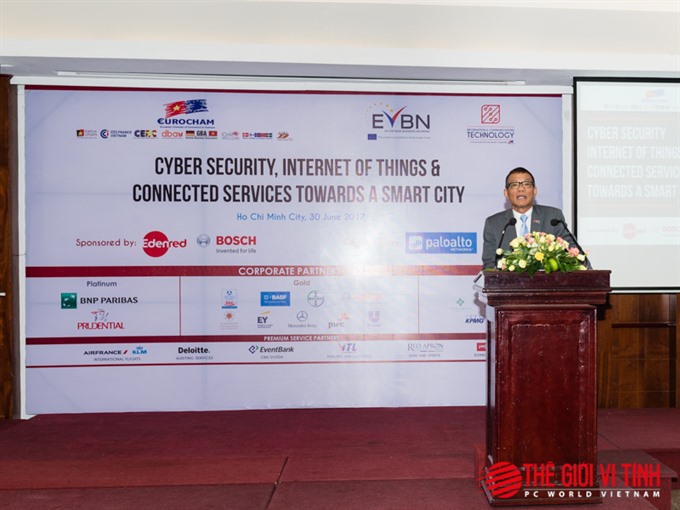 Society
Society

HCM City needs Europe’s experience and solutions to create smart cities, a conference heard Friday.
 |
| HCM City needs Europe’s experience and solutions to create smart cities, a conference heard Friday. – Photo pcworldvietnam |
HCM City – HCM City needs Europe’s experience and solutions to create smart cities, a conference heard Friday.
Speaking at the “Cyber security, Internet of Things and Connected Services towards a smart city” conference, organised by the European Chamber of Commerce in Việt Nam (EuroCham), Võ Quang Huệ, vice chairman of EuroCham, said: “The Smart Cities subject is one of great importance for EuroCham Việt Nam. EuroCham believes its members have a lot to offer for Việt Nam’s sustainable development.
“The relevant know-how developed and tested in Europe and all over the world needs no introduction and we are very keen to promote contacts between relevant companies and the Vietnamese Government for business opportunities that can produce concrete results in terms of a smart future for Việt Nam’s cities.”
Philip Hung Cao, security solution consultant at Palo Alto Networks, feared cyber security would be a nightmare for a smart city.
“All parts of a connected city like field components, data transmission network, data processing and of a smart city like data aggregation connectivity and smart processing face the threat of attack.”
He listed all the possible threats to smart cities like eavesdropping/wiretapping, unauthorised use/access, tampering/alteration, theft, distributed denial of services (DDos) and loss of reputation due to hacking besides hardware failure/multifunction, software error, operator/user error, electrical and frequency disturbance/interference, end of support obsolescence, acts of nature, and environmental incidents.
To avoid the security threats, he suggested seven solutions: building a risk-based approach to cyber security; setting clear priorities; defining minimum ICT security baselines; sharing and co-ordinating threats and vulnerability information; building incident response capabilities; boosting public awareness, education and workforce training; and enabling public, private and academic co-operation.
Guru Mallikarjuna, vice chairman of EuroCham’s information communication technology sector committee, and managing director, Robert Bosch Engineering and Business Solutions Vietnam Co.ltd, said: “Internet of Things is the basis for a broad smart city competency, and by 2020 four billion people will be connected with 25 million applications, 50 trillion gigabytes of data and 25 billion intelligent systems.”
He also listed challenges and solutions for mobility, energy and security, the three pillars of a smart city.
The challenges facing mobility are the need to reorganise/revitalise existing infrastructure and having a connected and efficient public transportation, he said.
The solutions are intelligent parking, fleet monitoring and management and intelligent traffic management, he said.
The challenges facing energy supply include management of peak demand, environmental impacts, improvement of existing infrastructure and their solutions are energy management, smart grid (metering, software) and smart water meters, he said.
The security challenges are public security (mass events, crime) and the impacts of natural disasters and video surveillance, emergency services and disaster response are the solutions, he added.
To grasp the opportunities in the context of the “fourth industrial revolution” and address various socio-economic issues, the Government has recently begun adopting measures to encourage cities to become smart cities.
Actions and initiatives have been taken with respect to several information and communication technology breakthroughs which are central to this shift like Internet of Things, Data Flow, Connected Services, e-governance, autonomous vehicles, artificial intelligence, robotics, and others. -- VNS




